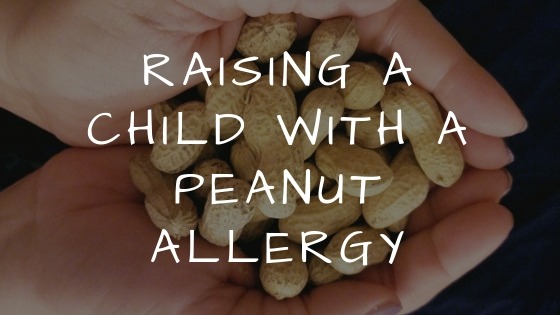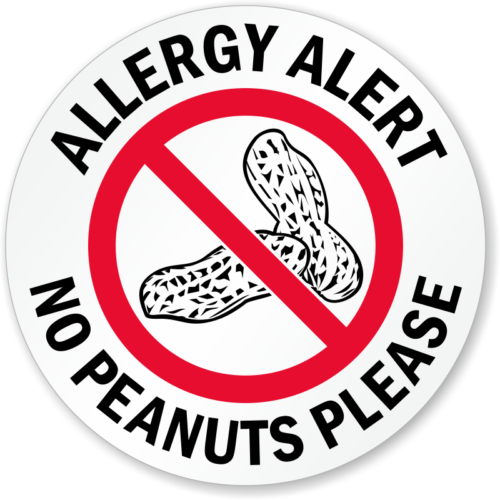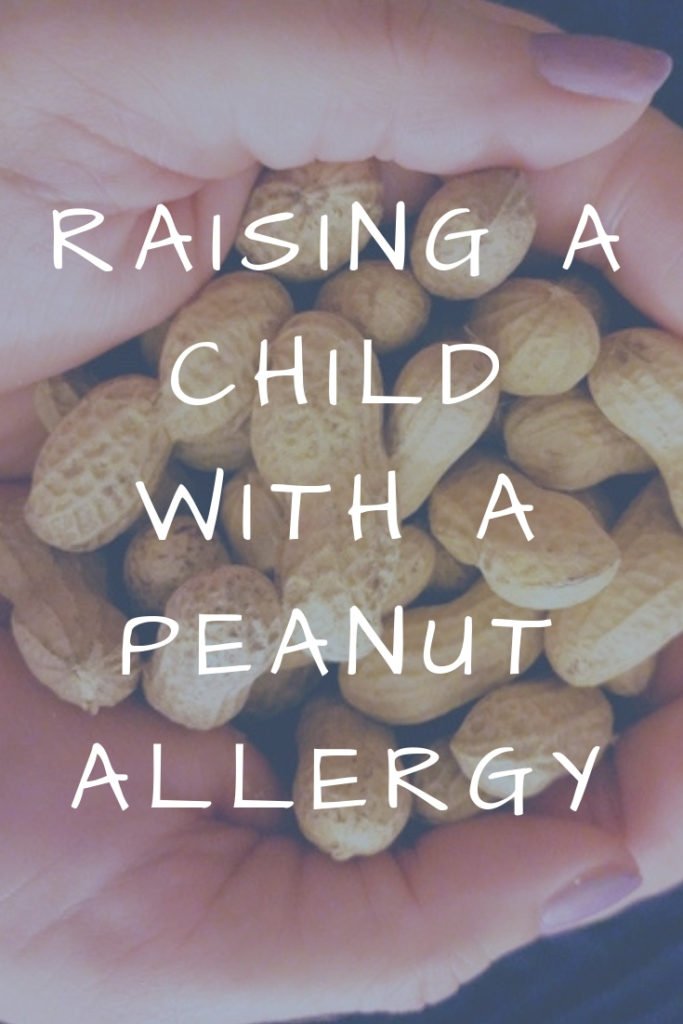“Unfortunately, it looks like Clara is allergic to peanuts.”
At these words, my heart sunk. Since we first found out Dashing Mom was pregnant I had been worried about Clara being Diabetic, but being allergic to a food had never even crossed my mind.
And I had no idea what to do.
Raising a child with a peanut allergy has brought all sorts of new ways of thinking into my life. Dashing Mom had been raised in a family with cousins that have severe food allergies, so it wasn’t a great mental leap for her. I had been raised as a Type 1 Diabetic. All of my thinking, and how I looked at food, was in relation to my diabetes. I had never known a single person with a food allergy and it quickly became apparent to me that I had a lot to learn.
Discovering a Peanut Allergy
Because I’m a Diabetic and Dashing Mom has experience with food sensitivities and allergies we have always been vigilant about watching Clara when she eats and looking for any sign of a reaction. It was because of this that once we introduced Clara to solids, we started noticing her break out in a rash and/or hives after eating peanut butter. Luckily for us this was a mild reaction, but it was a reaction none-the-less, so we took Clara to an allergy specialist.
It’s here that I would like to take a moment to mention that as a parent you should TRUST YOUR INSTINCTS. Dashing Mom was SURE Clara was having an allergic reaction to something, and while we guessed it was peanut butter we weren’t sure. Many people said it was likely nothing and to not worry about it. As a parent YOU know best and if in the end you take your child to the doctor and it’s nothing, then all you’ve done is assured yourself they’re ok – and there’s nothing wrong with that. I think you should always err on the side of caution.
At the allergy clinic they did a full allergy test, as well as blood work and confirmed that she was indeed allergic to peanuts (as well as horses, dogs and cats). She wasn’t allergic to tree nuts though and it was here that I really thought about the difference between the two.
The Difference Between Peanuts and Tree Nuts
Did you know peanuts were grown underground? Am I the only one that was amazed to find this out? Peanuts are a member of the legume family and not related to tree nuts. It is possible for a person to be allergic to peanuts or tree nuts, or both. Tree nuts typically include:
- Almonds
- Brazil Nuts
- Cashews
- Chestnuts
- Hazelnuts
- Macadamia Nuts
- Pecans
- Pistachios
- Pine Nuts
- Walnuts
- And others
Peanuts, on the other hand, are grown underground and as part of the legume family are related to peas and beans.
Guidelines For Introducing Your Child To Peanuts
Very shortly after Clara was born guidelines released by the National Institute of Allergy and Infectious Diseases (NIAID) had an updated view on when children should be introduced to peanuts. For these guidelines infants are divided into three groups: High, Moderate and Low-risk for developing a peanut allergy. The recommendations are as summarized by LiveScience:
High Risk Infants: These infants already have severe eczema, a severe egg allergy or both, putting them at high risk for developing a peanut allergy. Infants in this group should be fed peanut-containing foods as early as 4 to 6 months, if they have already started eating solid foods, the guidelines state. However, parents whose children fall into this group should first check with their doctors before starting their infants on peanut-containing foods.
Moderate Risk Infants: These infants have mild to moderate eczema. For these children, parents should introduce peanut-containing foods around 6 months of age, and parents do not need to seek evaluation from a doctor beforehand, the guidelines said. But parents can always consult with their doctors if they have questions.
Low Risk Infants: These infants do not have eczema or an egg allergy. They can have peanut-containing foods freely introduced into their diets along with other solid foods, the guidelines said.
In the past, doctors recommended that children who were at high risk for food allergies should avoid potentially risky foods, such as eggs and peanuts, until they were 2 to 3 years old. But in recent years, experts have changed their views on this issue. One particularly influential study found that, among children at high risk for developing a peanut allergy, those who were fed peanut-containing food early in life were about 80 percent less likely to develop a peanut allergy, compared to those who avoided the food.
Raising a Child With a Peanut Allergy
Obviously one of the first things we did when Clara was diagnosed was remove all peanut products from our house. But it turned out that this was harder than we thought. We were surprised to find out peanuts or peanut oil are in WAY more things than you would think just by looking. For instance, did you know that tons of other nuts – IE: Cashews – are roasted in peanut oil? So even though Clara isn’t allergic to cashews, we can’t have them in the house.
We also quickly got an Epipen and it now accompanies us everywhere that we go. (There is an Epipen shortage in Canada, however currently (as far as I know) it only effects adult Epipen’s, and Epipen Jr’s are still readily available).
It was the Epipen that brought reality crashing down on me.
At any moment Clara could go into anaphylaxis and without easy access to an Epipen, she could die. Suddenly going to playgroups, or parks, or the mall where other people and kids are, felt like risking her life.
And that, as a parent, is really scary.
So, whenever we go out I watch her vigilantly and her Epipen is always with me. Even still there has been two occasions where Clara has eaten something off the floor, or grabbed another kids snacks and eaten it without me being able to stop her in time. In both of these instances I was lucky that the food was chickpeas and carrots.
Can Kids Grow Out of a Peanut Allergy?
One of the first things we were told by the allergist that diagnosed Clara was that it was possible that she could outgrow it. We were also told that because she was so little when she got tested (12 months old) that we should re-test her when she turned two. We have booked an appointment to have her retested at the end of November, and hope for good news. But even if she is still allergic to peanuts, it is possible she could outgrow it.
In 2009 and 2010 a Chicago research team conducted a survey across the United States of 40,104 children to determine the prevalence of food allergies and the probability of outgrowing them. The survey found that approximately 25 per cent of the children surveyed who had a food allergy outgrew that allergy. The average age of overcoming their allergy was 5.4 years.
There are a lot of factors that go into whether you can outgrow an allergy according to this survey. The information suggested that children with allergies to soy, egg and milk had the strongest chances of achieving tolerance while children with allergies to shellfish, tree nuts and peanuts had the lowest chance.
Despite this, we are hopeful that Clara will one day outgrow her allergy, but until then we will stay vigilant on what she eats and where and will always have an Epipen on us.

Can your child have a reaction from smelling peanuts/peanut butter?
There’s a lot of information out there, and a lot of it is wrong, but I’ll be honest I didn’t know the answer to this question before Clara was diagnosed. Rather than try to articulate it myself, here is our allergists response in his own words:
In order to have anaphylaxis (a severe allergic reaction) to a food, you must come in contact with the protein on a mucous membrane (ie. the mouth, nose, eyes). While this can occur from airborne particles, it is very, very uncommon.
The most common scenario patients ask about is smelling peanut butter. What gives the scent of peanut butter is not a protein. What you are smelling is a chemical called pyrazine and this cannot trigger an allergic reaction. If, however, you were to inhale peanut flour or dust (ie. someone opens a bag of peanuts at a baseball game and the particles get in the air) then you could theoretically have a reaction. These are typically mild reactions.
I have been working in allergy for 4 years and have yet to see any serious allergic reactions to airborne food particles. I have, however, seen many patients who have anxiety provoked reactions from smelling a food. The symptoms of severe anxiety (aka a panic attack) can closely resemble an allergic reaction – increased heart rate, skin flushing, the sensation that one’s throat is closing, and many patients will assume they are having an allergic reaction. These symptoms are real and by no means are these patients “faking”. Living with food allergies is justifiably stressful. If a patient presents with these symptoms to an emergency department, it can be difficult to differentiate an allergic reaction from a panic attack, and often these patients are treated as if they are having anaphylaxis. One test that can help differentiate between a panic attack and allergic reactions is called a SERUM TRYPTASE but must be ordered during the attack. This is a blood test that is elevated for 4 hours after an anaphylactic reaction and should not be elevated during a panic attack.
Final thoughts on raising a child with a peanut allergy
Sure I miss peanut butter and perhaps the first thing Dashing Mom and I do when Clara has a sleepover at her grandparents is get a Reese Peanut Butter Cup from the store, but obviously the health and safety of Clara is most important. Having to give up peanuts is a small price to pay for making sure she’s ok. Having a child with a peanut allergy is scary, but all we can do is remain vigilant and hope that one day she will outgrow it.
Update November 2019
For the last six months we have started a desensitization program for Clara’s peanut allergy. It has been a big success so far, and she is now up to a serving of peanut butter that is about the size of a peanut. Below is more information on this approach.
Oral immunotherapy (OIT) refers to feeding an allergic individual an increasing amount of an allergen with the goal of increasing the threshold that triggers a reaction. For example, a person allergic to peanuts may be given very small amounts of peanut protein that would not trigger a reaction. This small amount is gradually increased in the allergist’s office or a clinical research setting over a period of months. The goal of therapy is to raise the threshold that may trigger a reaction and provide the allergic individual protection against accidental ingestion of the allergen. OIT is not a curative therapy. Individuals who receive OIT will continue to carry epinephrine, read labels closely, etc., and it is not expected that OIT will lead to ingestion of the allergen without limitation.
***I am not a doctor and in no way should any of this information be taken as medical advice without the consultation of your doctor. This is our experience only, and should be treated as such.***
If you liked this post, I’d love it if you shared it with YOUR Inner Circle. Don’t have an Inner Circle? Join mine!




Leave a Reply